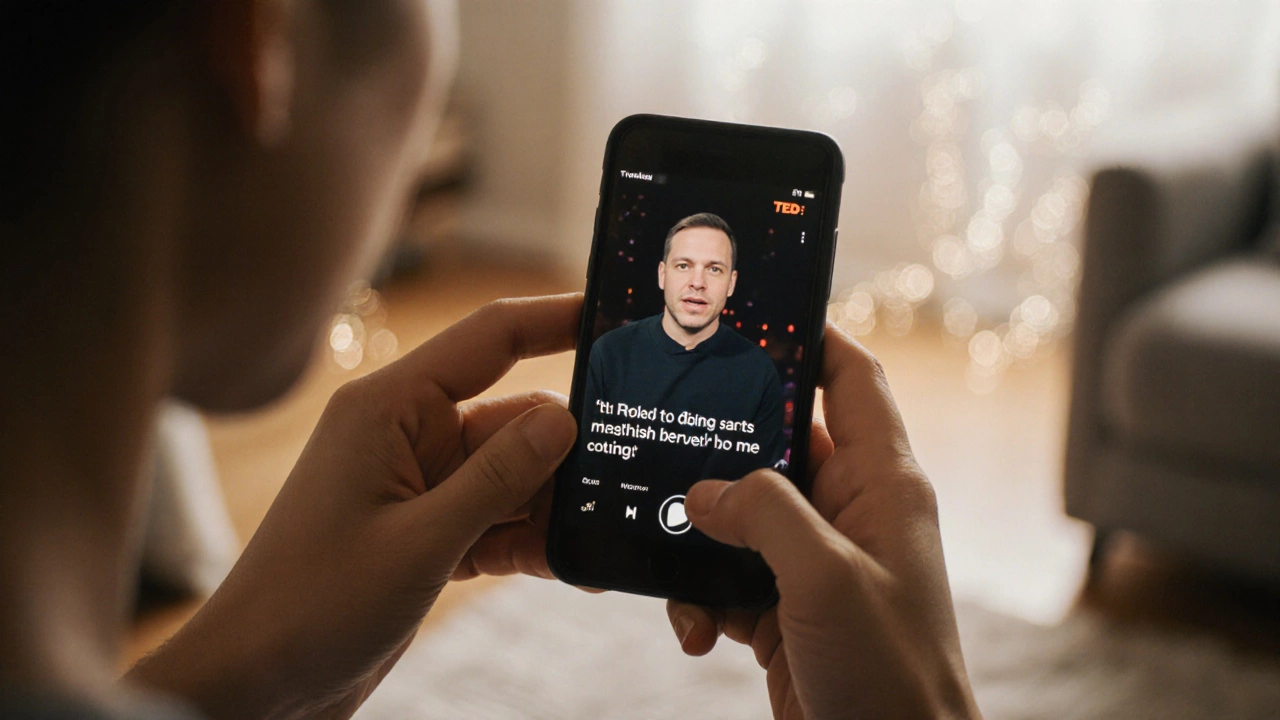Natural English Practice
Learn the natural speech patterns native speakers use every day. Instead of "I want to go," say "I wanna go." Master these patterns to sound more fluent and confident.
How It Works
Each phrase shows a formal version on the left and the natural spoken version on the right. Try typing the natural version, then check your answer.
Why This Matters
Native speakers use these natural forms constantly. Using them makes you sound more fluent and natural. They're not slang - they're part of how English flows. The article explains that 'fluency isn't about perfection - it's about being understood without hesitation.'
Most people who learn English spend years memorizing grammar rules and vocabulary lists-only to freeze when someone asks them a simple question in real life. You know the words. You understand the sentences. But when you open your mouth, the words stumble, the tenses twist, and you end up saying something that sounds off-even if it’s technically correct. The problem isn’t your brain. It’s how you learned.
Fluency isn’t about perfection-it’s about flow
Stop chasing perfect grammar. That’s the trap. Native speakers make mistakes all the time. They say ‘I seen’ instead of ‘I saw.’ They drop articles. They use ‘they’ as a singular pronoun. And no one corrects them because they’re understood. Fluency isn’t about zero errors. It’s about being understood without hesitation.
Think of it like driving. You don’t learn to drive by memorizing every traffic law before touching the wheel. You get behind the wheel, make small mistakes, learn from them, and slowly get better. Speaking English works the same way.
The goal isn’t to never make a mistake. It’s to keep talking even when you do.
Stop translating in your head
If you’re waiting to translate from your native language into English before speaking, you’re already too late. Translation creates delay. That delay is what makes you sound nervous, awkward, or slow.
Here’s how to fix it: Start thinking in English. Not writing in English. Not speaking in English. Thinking in English.
Try this: For 10 minutes every morning, describe what you see around you in your head-out loud, if you’re alone. ‘The kettle is boiling. The sun is shining through the window. I need to call my sister.’ Don’t pause to check if it’s grammatically perfect. Just say it. Your brain will start building direct connections between ideas and English words, skipping the middleman of translation.
Studies from the University of Manchester show that learners who practiced internal monologue in English for just 15 minutes a day improved their speaking speed by 40% in six weeks.
Shadowing: The secret weapon of fluent speakers
Shadowing is simple. You listen to a short audio clip-just 10 to 20 seconds-and repeat it out loud, trying to match the speaker’s rhythm, tone, and speed. Not word-for-word. Not perfectly. But as closely as you can.
Use YouTube videos from native speakers: TED Talks, BBC News, or even vloggers talking about their day. Pick someone whose accent you like. Press play. Pause after every sentence. Repeat it. Then do it again. Do it three times.
Why does this work? Because your mouth learns the physical movements of English. The way the tongue moves for ‘th’ sounds. The rise and fall of questions. The way native speakers link words: ‘wanna’ instead of ‘want to,’ ‘gonna’ instead of ‘going to.’ These aren’t slang-they’re natural speech patterns. Shadowing trains your mouth to make them without thinking.
Do this daily for 10 minutes. In four weeks, you’ll notice your pronunciation sounds more natural. People will stop asking you to repeat yourself.
Speak to yourself-out loud
You don’t need a conversation partner to get better. You need to use your voice. A lot.
Talk to yourself while cooking. While walking. While brushing your teeth. Describe what you’re doing. ‘I’m cutting the onions. They’re making my eyes water. I should turn off the stove soon.’
Or play pretend. Imagine you’re ordering coffee. ‘Hi, can I get a large latte with oat milk, please? No sugar.’ Then imagine the barista replies. ‘Sure, that’ll be £3.50.’ Then you respond. ‘Thanks! Have a good day.’
This isn’t silly. It’s rehearsal. You’re practicing real-life scenarios so when they happen, your brain doesn’t panic. You’ve already done it in your head-now you just need to say it out loud.

Record yourself and listen
Most people hate hearing their own voice. But if you want to improve, you have to listen.
Use your phone. Record yourself speaking for one minute. Pick a topic: ‘My favorite holiday,’ ‘Why I like coffee,’ ‘What I did yesterday.’ Speak naturally. Don’t script it. Then listen back.
Don’t focus on mistakes. Focus on patterns. Do you always pause before ‘the’? Do you raise your voice at the end of every sentence, even when it’s not a question? Do you say ‘um’ every three seconds?
These are your personal habits. Once you hear them, you can fix them. One habit at a time. Don’t try to fix everything at once.
Do this once a week. In a month, you’ll hear the difference. You’ll sound more confident. More controlled. More like you know what you’re saying.
Don’t fear correction-ask for it
Many learners avoid speaking because they’re afraid of being corrected. But here’s the truth: people who correct you are helping you. They’re not judging you.
Next time you’re talking to someone in English, say this: ‘I’m trying to improve my speaking. If I make a mistake, can you gently correct me?’ Most people will say yes. And if they don’t, that’s okay. You’re still practicing.
When someone corrects you, don’t get defensive. Just say ‘Thanks’ and repeat the sentence correctly. That’s it. One repetition locks the right version into your memory.
Example: You say, ‘I go to the shop yesterday.’ They say, ‘You mean “I went.”’ You say, ‘Right, I went to the shop yesterday.’ Done. That moment sticks.
Use the 80/20 rule: Learn what matters most
You don’t need to know 10,000 words to speak fluently. You need to know the right 20%.
Research from Cambridge University shows that just 800 core words make up 75% of everyday spoken English. These are words like: get, go, do, make, have, say, come, see, know, think.
Learn these words in phrases, not alone. Don’t just memorize ‘get.’ Learn:
- I get it.
- Get me a coffee.
- Get better.
- Get ready.
- Get lost.
These phrases are the building blocks of real conversation. Master them, and you’ll understand and respond to 80% of daily talk.

Stop waiting for ‘ready’
You’ll never feel 100% ready. That’s a myth. The people who speak fluently didn’t wait until they knew everything. They started speaking with what they had.
Think of it like learning to ride a bike. You don’t wait until you’ve studied aerodynamics and gear ratios. You hop on, wobble, fall, get up, and try again.
Start now. Speak to a stranger online. Join a free English conversation group on Meetup. Talk to a barista. Call a customer service line and ask a simple question. Don’t wait for perfection. Wait for action.
Fluency isn’t a destination. It’s a habit. The more you speak-even badly-the faster you improve. Every mistake is data. Every retry is progress.
What’s holding you back?
Here’s the real question: Are you afraid of sounding stupid? Or are you afraid of not trying?
You’ve already learned a lot. You know grammar. You know vocabulary. What you need now is practice-not more study.
Start small. Speak for five minutes today. Record it. Listen. Try again tomorrow. In a month, you’ll look back and wonder why you waited so long.
Can I become fluent in English without living in an English-speaking country?
Yes. Many people become fluent without ever leaving their home country. What matters isn’t location-it’s exposure and practice. Use podcasts, YouTube, language exchange apps like Tandem or HelloTalk, and daily speaking routines. Consistency beats geography every time.
How long does it take to speak English fluently without mistakes?
There’s no fixed timeline. But most people who practice daily-15 to 30 minutes of focused speaking-see major improvement in 3 to 6 months. Fluency isn’t about time. It’s about repetition. Someone who speaks for 10 minutes a day for a year will outperform someone who studies for 2 hours once a week.
Why do I make the same mistakes over and over?
Because you haven’t corrected them in context. Memorizing a rule doesn’t fix a habit. You need to hear the correct version, say it out loud, and repeat it until it feels natural. Use recording and shadowing to retrain your mouth. And don’t be afraid to ask for feedback-each correction is a step forward.
Should I focus on pronunciation or grammar first?
Focus on being understood. Clear pronunciation matters more than perfect grammar in everyday speech. A simple sentence with great pronunciation will be understood. A complex sentence with poor pronunciation won’t. Work on sounds like ‘th,’ ‘v’ vs ‘w,’ and word stress. Use shadowing to train your mouth. Grammar will improve naturally as you hear more real English.
Is it okay to use slang or informal English?
Yes-if you’re speaking casually. Slang like ‘gonna,’ ‘wanna,’ or ‘kinda’ is part of real English. Avoid it in job interviews or formal emails, but in daily conversations, it makes you sound natural. Learn the difference between formal and informal settings. Don’t avoid slang-learn when to use it.
Next steps: Your 7-day fluency challenge
Here’s what to do this week:
- Day 1: Record yourself speaking for 60 seconds on ‘My favorite food.’ Listen back.
- Day 2: Shadow a 20-second clip from a YouTube vlogger. Repeat it 5 times.
- Day 3: Talk to yourself for 5 minutes while making tea or coffee.
- Day 4: Ask a friend or online partner to correct one mistake you make.
- Day 5: Learn 5 new phrases with the word ‘get.’ Use them in sentences.
- Day 6: Watch a 5-minute YouTube video in English. Don’t use subtitles. Just listen.
- Day 7: Record yourself again. Compare it to Day 1.
You won’t sound perfect. But you’ll sound better. And that’s the point.





